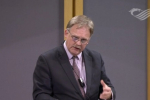
Shadow Social Justice Minister and North Wales MS Mark Isherwood has today called for the Welsh Government to work with public bodies, including schools and colleges, to explore measures to prevent problem debt.
Speaking in today’s Welsh Parliament Opposition Debate on Household debt, Mr Isherwood, who Chairs the Cross Party Group on Fuel Poverty and Energy Efficiency, also called for Welsh Government action to tackle fuel poverty, expressing concern that there is still not a Cold Weather Plan in place in Wales.
He said:
“As the Bevan Foundation’s Report ‘Debt in the Pandemic’ states “Thousands of people across Wales were living in problem debt long before the pandemic”, and although “home working and reduced opportunities to spend due to Covid-19 restrictions have enabled some households to pay down debt …the economic impact of Covid-19 has seen the financial position of many Welsh families deteriorate, pushing some into problem debt for the first time and deepening the amount of debt owed by some of those already struggling.”
“As this makes clear, the issue is ‘problem debt’, not simply ‘debt’, which includes risk-based mortgages and car loans. Hence our proposed replacement of point 5c of the motion. In calling, instead, for the Welsh Government to work with public bodies, including schools and colleges, to explore measures to prevent problem debt, I have in mind the extensive work done on this issue during previous Senedd terms. I was a member of the Communities and Culture Committee which produced the “Financial Inclusion and the Impact of Financial Education” Report, eleven years ago.
“Quoting Les Cooper, then co-ordinator of the North Wales Financial Capability Forum, but sadly no longer with us, this stated “resources and methods that are currently used to increase financial capability do not address the basic skills challenges we have in Wales”. Les had championed the award-winning scheme in some Flintshire schools which delivered financial literacy through participative theatrical performance. They even brought their production to the Senedd, in the hope that this best practice model would be shared and adopted across Wales.
“Questioning the First Minister here in January 2018, I quoted Money Advice Service research which found that many young people in Wales are ill-prepared for dealing with adult financial responsibilities, with just 35 per cent learning about money management in school, and asked him to revisit the recommendations of the 2010 Communities and Culture Committee Report.”
He added:
“Our other amendments call for Welsh Government action to tackle fuel poverty, including the production of regular estimates of the number of fuel-poor households in Wales, where previous estimates have been sporadic, in 2004, 2008 and 2018. In 2018, prior to the pandemic, it was estimated that 12% or 155,000 households in Wales were in fuel poverty. Prior to COVID, Wales saw a 45% increase in 2019-20 excess winter deaths. Wales has some of the oldest and least thermally efficient housing stock compared to the UK and Europe.
“On 1st October, the Energy Price Cap, set by Energy Regulator OFGEM, increased after gas prices hit a record high as the world emerged from lockdown. Although the price cap ensures that suppliers only pass on legitimate costs to customers, NEA Cymru has estimated that this rise could plunge 22,500 more households in Wales into Fuel Poverty this Winter and that we could see the numbers in fuel poverty rise by 50% or more compared to 2018 estimates, and called for deeper protection for low-income households this winter.
He added: “It is nearly three years since the Welsh Government stated that it would be developing a Cold Weather Plan in conjunction with Public Health Wales and, when I asked the Social Justice Minister here last month what specific year-round Cold Weather Resilience Planning the Welsh Government is planning now, the Minister replied “we will have a cold weather plan in place” – but we needed this published and operating before another cold winter was upon us.”
